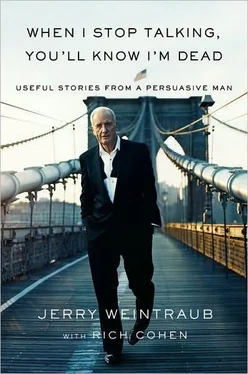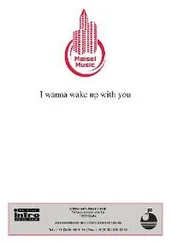The Colonel says, "It's very simple, Hal. Tell him he's not Rudolph Valentino."
That, as far as I know, was the extent of the Colonel's creative involvement in Presley's career.
After I gave the Colonel the cashier's check, he brought me to meet Elvis, who had a suite in the Hilton International. He must've been performing there at the time.
We knocked on the door, went in, and there was Elvis. He was in his thirties, about five years older than I was. It was his Sun God phase, scarves, flare-legged jumpsuits, white boots, hair long and breaking like a wave from forehead to the nape of his neck. Hal Wallis was right. He was a handsome man. "This is Jerry Weintraub," the Colonel told him. "He's the man I told you about, who paid a million dollars for you. He's going to work with us."
Elvis shook my hand and said, "It's an honor, sir. I appreciate it. There is only one thing I ask when we're on the road: Please make sure, when I perform, that every seat is filled. And please make sure my fans are in the front rows-not the big shots."
Elvis was older than me. He was also the biggest star in the world. Yet he called me sir. It's how he was raised. He was uneducated and country, but really, in many ways, a true gentleman. What happened to him later, with the drugs and the weight, was a tragedy.
We went on the road a few weeks after that. We picked the cities and dates and arenas. I did all this with Tom Hulett, who was my partner in the concert business. We did everything together. It was a groundbreaking tour. It changed the nature of the business. Before that, the concert business had been broken into territories, each region of the country controlled by a local promoter-who picked the venue, sold the tickets, arranged the publicity, and so on. There was no such thing as a national tour. An artist moved from fiefdom to fiefdom, and the manager cut deals with local power brokers-the man who "owned" Philadelphia, the man who "owned" Buffalo -who made subsidiary deals with local police, local unions, local arena operators. This system was byzantine and wasteful. At each step, the local promoter paid off and kicked back, cut sweetheart deals, cooked the books, even took profits from the hit tours to pay for the dogs. When the artists came off the road, they always had less money than they believed they had earned.
But if you tried to go around the local promoters and cut your own deals, you would find yourself frozen out of the territory. No one would rent you the hall if it was not through the local guy, who was, after all, kicking money back to the operator. But the balance changed when I was booking Elvis. I was finally able to cut deals directly with the arenas, as no one would turn away the show. Elvis was simply too big. If you said no, someone else would say yes, meaning you would miss out on the biggest payday ever. This was what I had meant when I told the Colonel I had a better way to take Elvis on the road. I cut out the middleman, which drove down costs and increased profits, meaning more money for everyone. What's more, I structured the deal as a production, like a play, in which Elvis, the Colonel, and I split the profits. I was not an agent taking a percentage, I was a partner taking a share. If Elvis saved money, I saved money; if Elvis was enriched, I was enriched. Since one person booked the entire tour, there were also economies of scale. I got better deals because I put on more shows. As a result, artists who signed with me-I am talking about later, after I went out with Elvis-made more money. Which attracted more artists. Which meant the local operators, if they wanted shows for their arenas, had to work with me. This is how I broke the old system.
None of this was easy. Every local promoter wanted me destroyed. I was ending their reign. It was a tremendous fight, but I knew if I came out intact I would have a new livelihood: This became my company, Concerts West, which, within a few years, was the largest concert business in the world. In this way, I became the most hated man in the industry. But as Don Corleone said, "It's better to be feared than loved."
When I booked that first Elvis tour, I did not know what I was doing. I was such a neophyte. Being as naive as I was about the business, I had Elvis open on the Fourth of July in Miami Beach. Have you ever been to Miami Beach in the middle of July? It's a swamp. It's five million degrees and humid as hell. No one is there, and no one should be. We booked the convention center, which had ten thousand seats.
About two weeks out, I called the guy who ran the box office. I asked him how we were doing.
"Great," he said. "We're sold out."
"Really? Sold out? Already? That's fantastic."
I thought for a moment, then said, "Hey, what do you think of a matinee?"
"Great!" he said. "You'll have no problem selling it. Demand is through the roof."
I went back and asked the Colonel.
"Yeah, yeah," he said. "Book it."
One day. Two shows. Twenty thousand seats. Big-time show business.
As soon as we stepped off the plane in Miami, we needed a shower. The heat waves shimmered. Anything more than fifty yards away looked like a mirage. The concierge from the Fontainebleau sent a limousine to pick us up. I got in, smiling. The Colonel just stood there.
"Hey, come on," I said. "What are you waiting for?"
He said, "Sorry, son, but that just ain't my kind of fancy."
Instead, he climbed into the station wagon that had been sent for the luggage.
I dropped off my bags and went to the arena.
I walked into the box office and asked for the guy I had been talking to on the phone. I wanted to check the gate. The concert was the next afternoon. He was sitting in the office, holding this huge stack of tickets, smiling.
"What are those?" I asked.
"What are what, Mr. Weintraub?"
"In your hand," I said.
"These are your tickets," he said. "For Elvis. The matinee."
"Are people coming to pick them up?" I asked.
"No, Mr. Weintraub. These are the tickets that have not sold."
"What do you mean? You said you would sell them all."
There were maybe five thousand tickets in his hand-half the house. My mind was racing, a single word tolling in my mind: disaster, disaster, disaster! What did Elvis tell me, his one thing? "I just don't want to sing to any empty seats."
I got close to the ticket seller, looked into his cold, pinprick eyes. "Why did you tell me we were sold out?" I asked.
He shrugged and said, "I was just telling you what you wanted to hear."
I went wild, grabbed him by the shirt, shook him, swearing. He grinned. I picked him up, slammed him into the wall. People came running. They pulled me off. Someone said, "Take it easy. You're gonna kill him!" I stormed out, trying to cool down, trying to think. My career is going to be over before it begins. I walked outside, then followed the street to the beach. I was thinking about the concert, about what would happen when Elvis saw all those empty seats. What can I do? Give away the tickets, confess to Elvis, throw myself on the mercy of the Colonel?
On the way back to the arena, I passed the county jail, a windowless fortress just across from the Civic Center. I wandered around the arena until Elvis showed up with his entourage for rehearsal and sound check. I pulled the Colonel aside.
"What's happening, son?" he asked.
"Well, Colonel, we have a problem," I told him.
"Oh, we do," he said. "What's our problem?"
"It seems I was misled before I booked the matinee," I said, "and now I'm stuck with five thousand unsold seats."
He pushed his hat back and said, "Well, son, as far as I can tell, we don't have a problem. You have a problem."
"Yeah, well, what should I do?" I asked.
"I'll tell you what you should do," he said. "You should fix your problem."
Читать дальше

![Сьюзан Кейн - Quiet [The Power of Introverts in a World That Can't Stop Talking]](/books/33084/syuzan-kejn-quiet-the-power-of-introverts-in-a-wo-thumb.webp)










